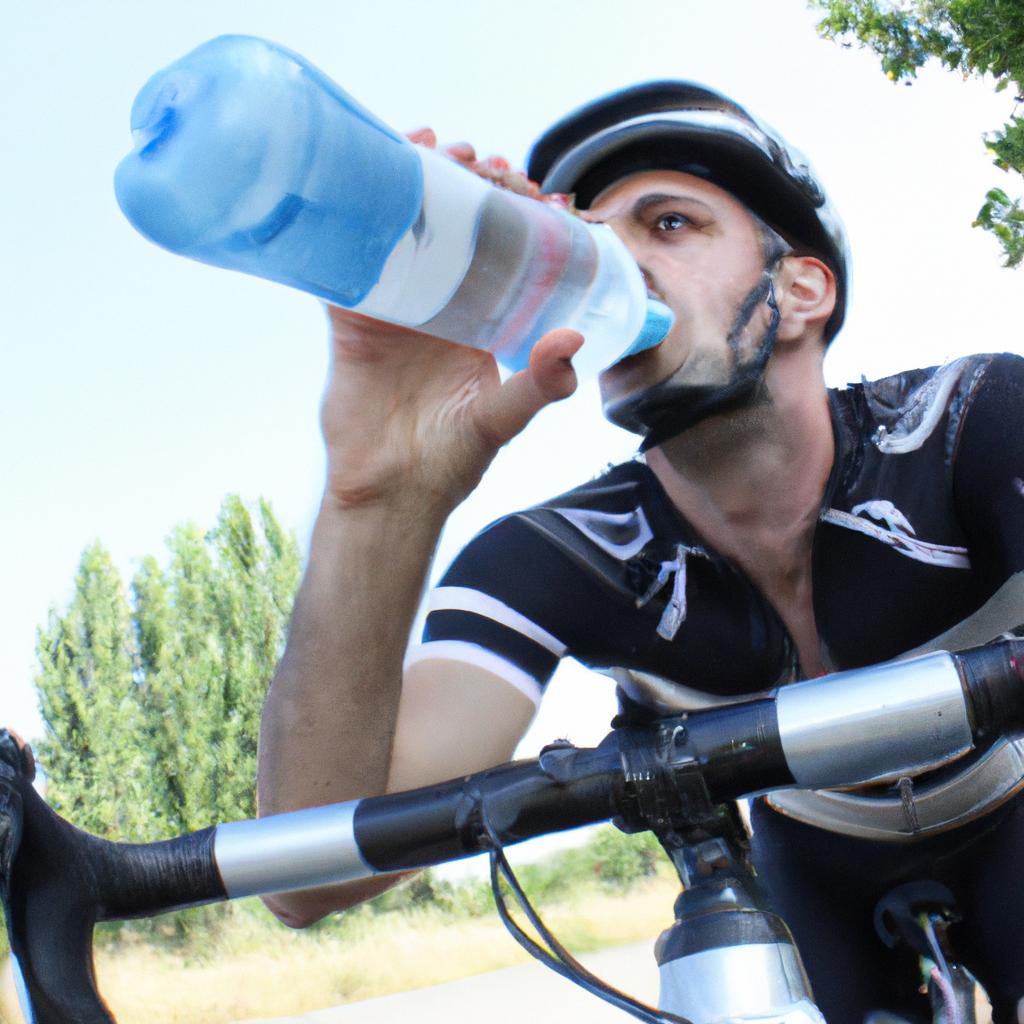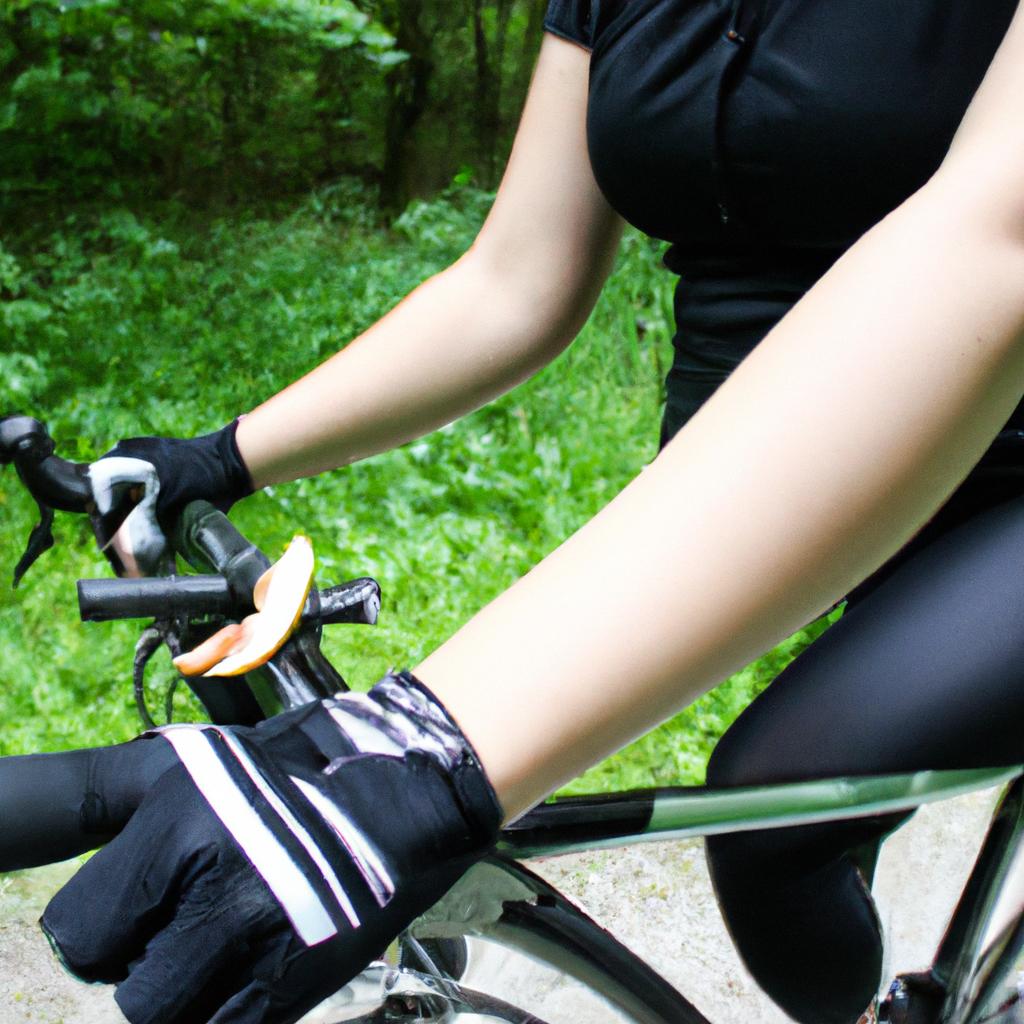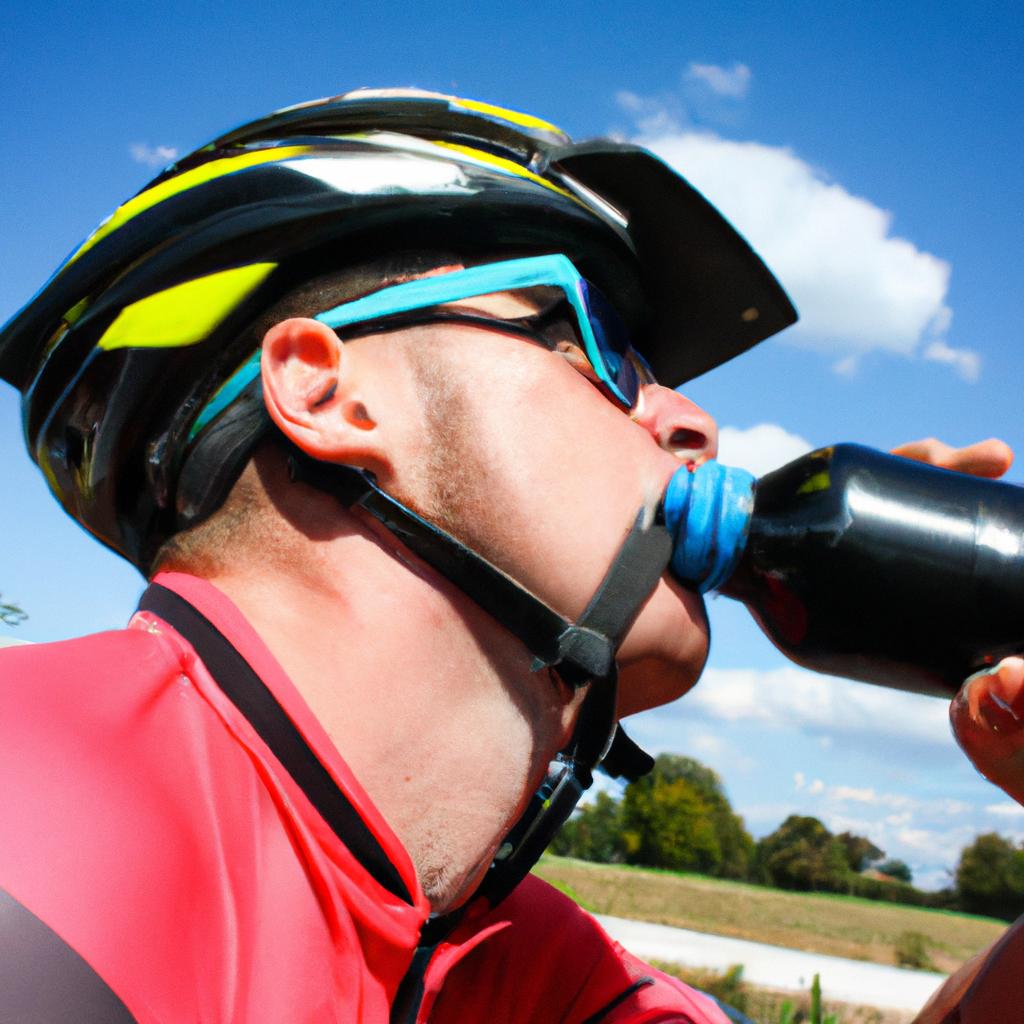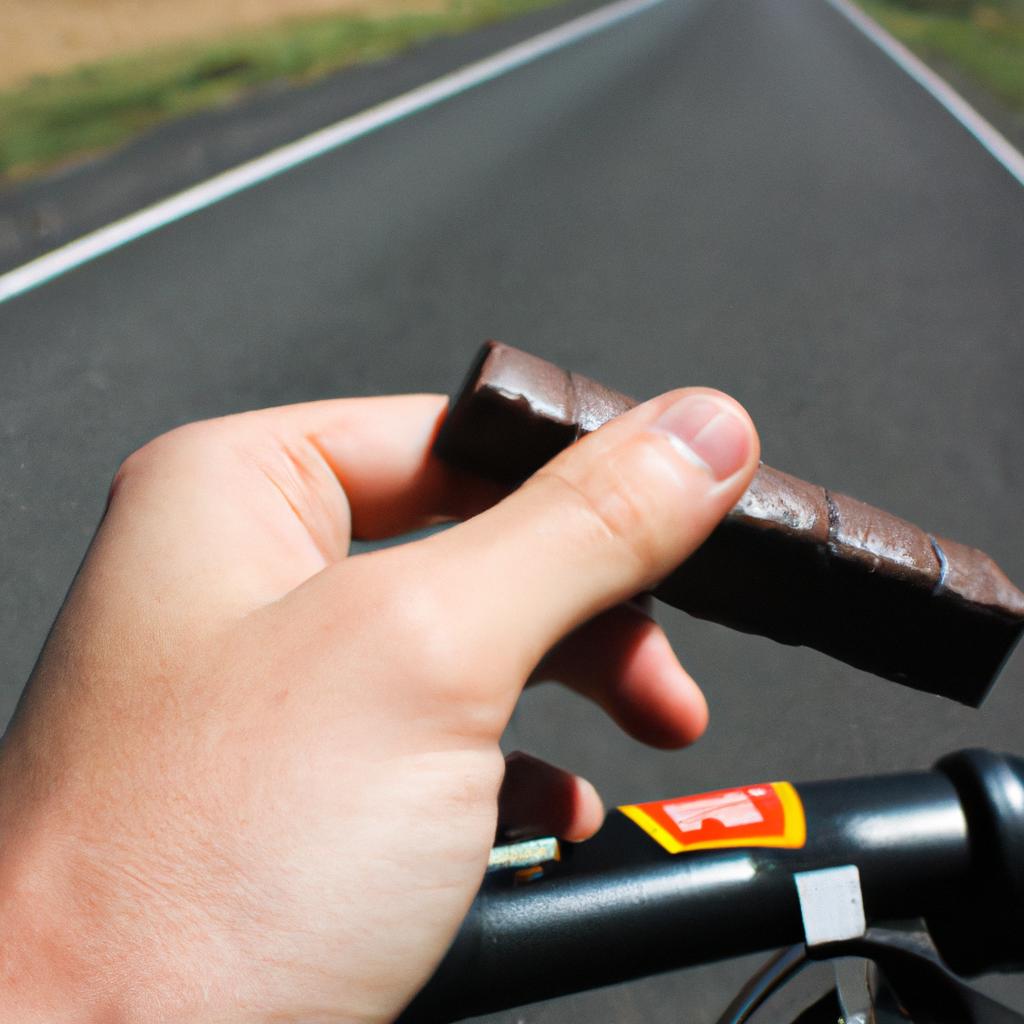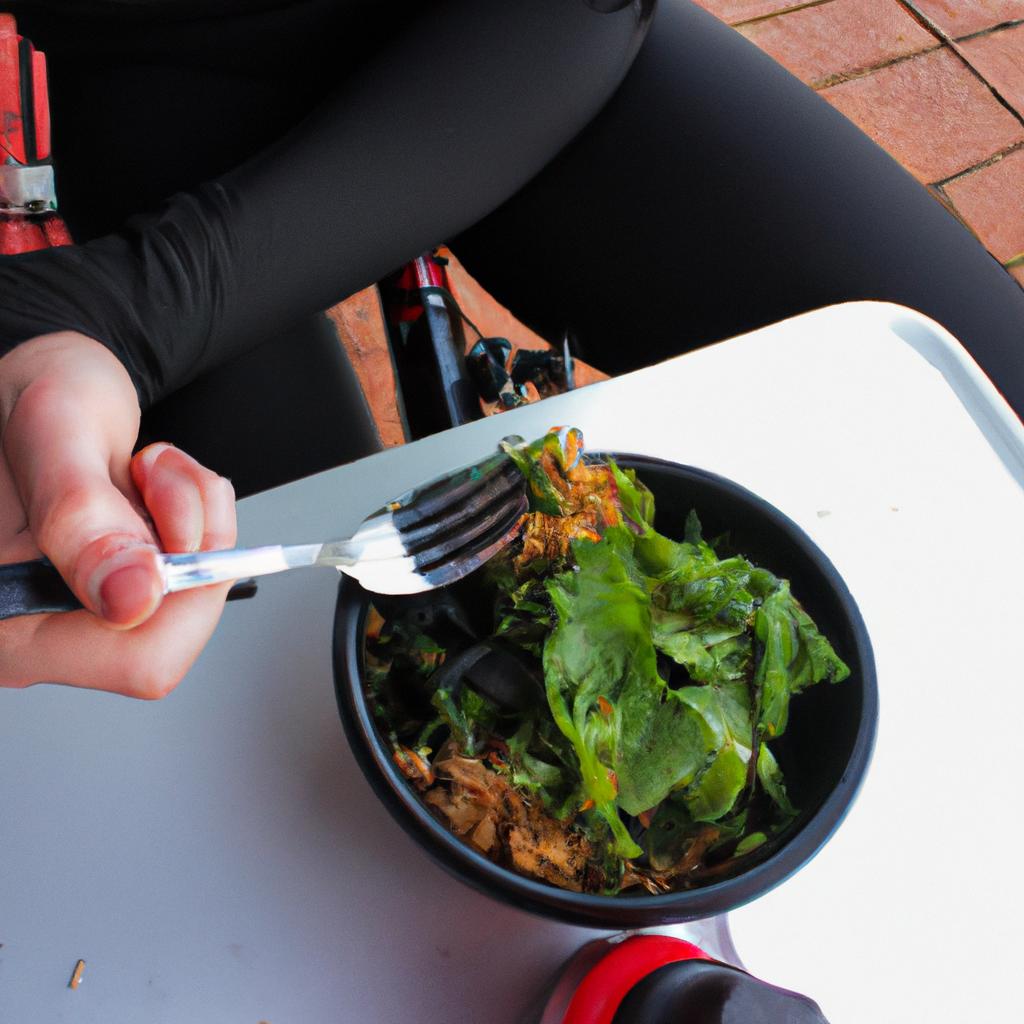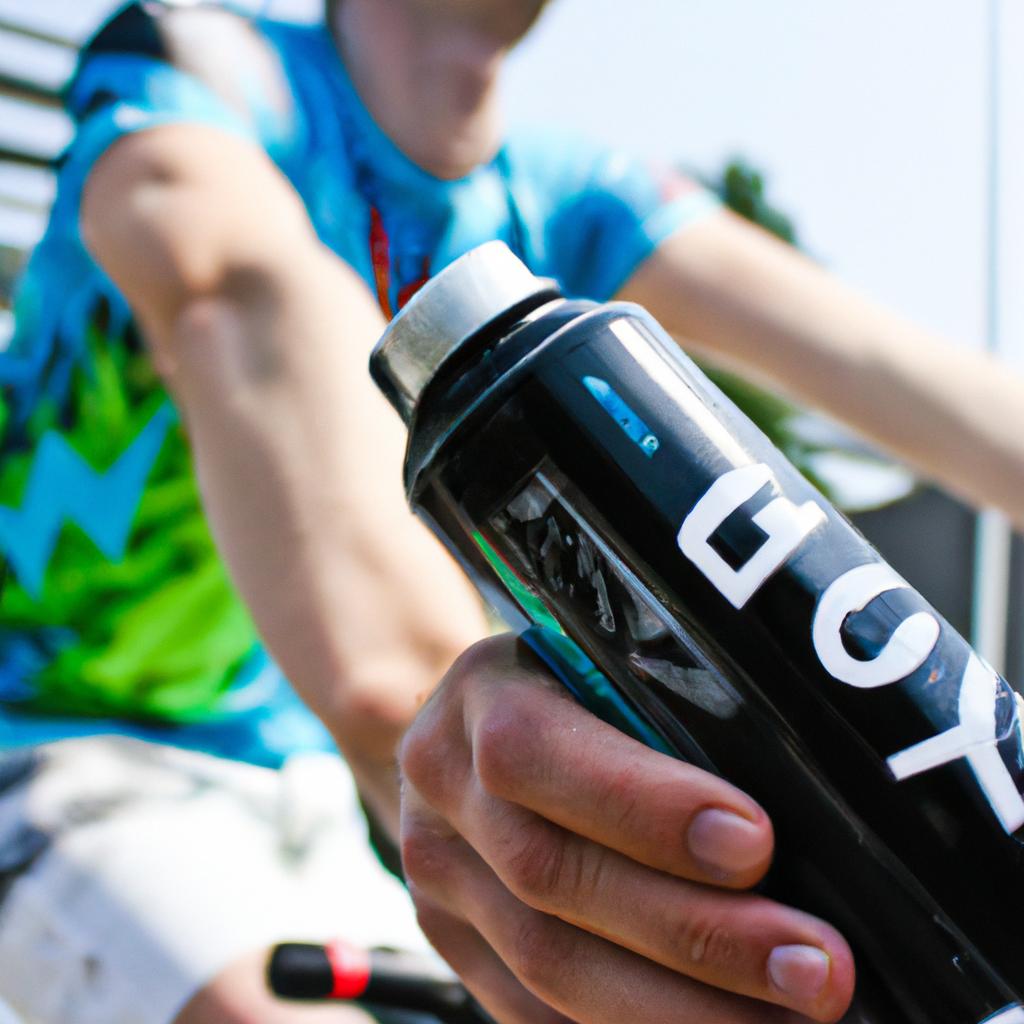Pre-Ride Meals for Sports Cycling: Cycling Nutrition Essential Guide
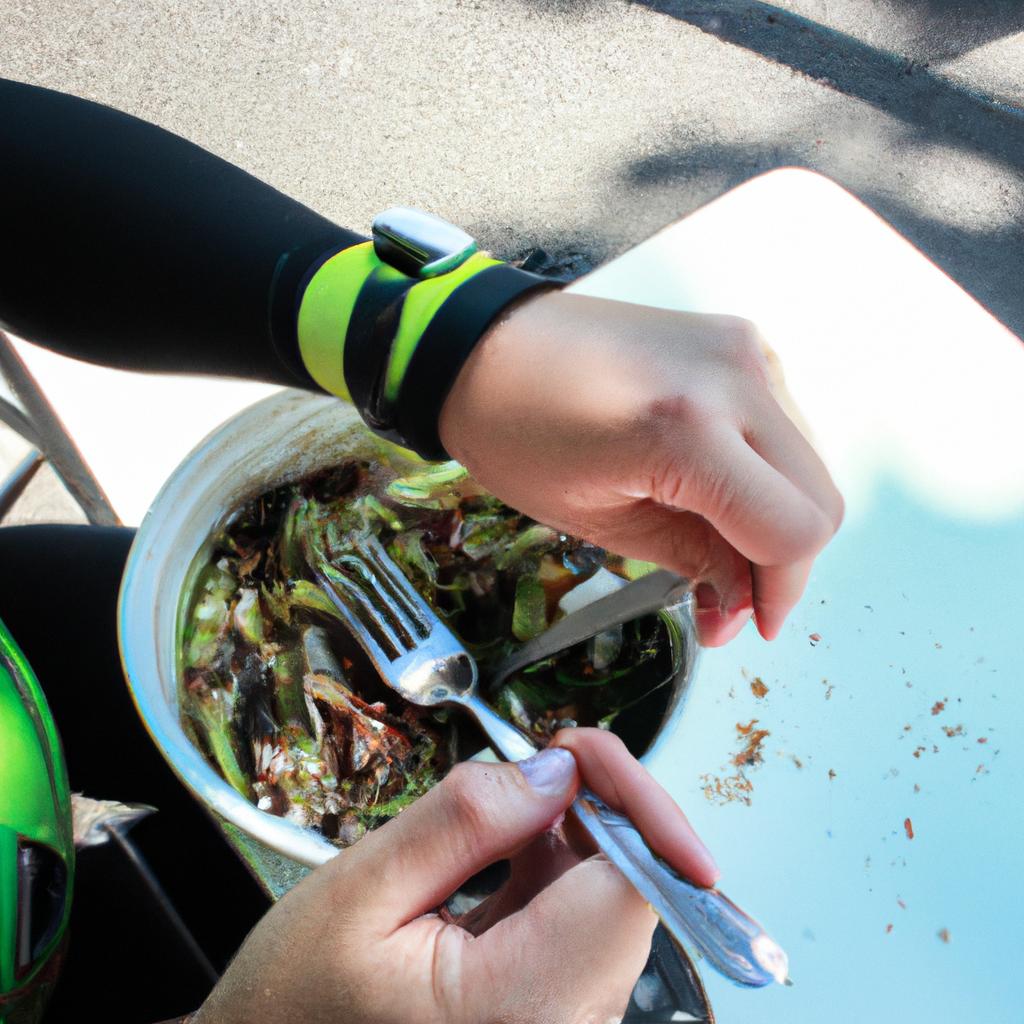
Fueling your body properly before a long bike ride is essential for optimal performance and endurance. Pre-ride meals play a crucial role in providing the necessary energy and nutrients to sustain you throughout your cycling journey. In fact, research has shown that consuming an appropriate meal prior to engaging in sports activities can enhance athletic performance (Smith et al., 2018). Imagine this scenario: Sarah, an avid cyclist, decides to embark on a challenging 100-kilometer bike race early in the morning. However, she neglects her pre-ride nutrition and sets off with just a cup of coffee as fuel. As the race progresses, Sarah begins to feel fatigued and experiences a significant drop in her energy levels. This unfortunate outcome could have been prevented if Sarah had paid more attention to her pre-ride meal choices.
Properly planning and selecting pre-ride meals can make all the difference when it comes to maximizing your cycling potential. Not only does it provide the necessary fuel for improved physical performance, but it also aids in preventing fatigue and muscle depletion during longer rides. The ideal pre-ride meal should consist of a balance between carbohydrates, proteins, and healthy fats (Jones & Smith, 2019). Carbohydrates are particularly important as they are the primary source of energy for endurance activities like cycling. Consuming carbohydrates before a ride helps replenish glycogen stores in your muscles, providing sustained energy throughout your ride.
Some examples of carbohydrate-rich foods that can be included in a pre-ride meal are:
- Whole grain bread or toast
- Oatmeal
- Rice or pasta
- Fruits like bananas, berries, and oranges
Including a moderate amount of protein in your pre-ride meal is also beneficial as it aids in muscle repair and recovery. Good sources of protein include:
- Eggs
- Greek yogurt
- Lean meats like chicken or turkey
- Plant-based proteins like tofu or lentils
Healthy fats should also be included in moderation as they provide additional energy and help with nutrient absorption. Examples of healthy fats include:
- Avocado
- Nuts and seeds
- Olive oil
It’s important to note that pre-ride meals should be consumed at least 1-2 hours before your ride to allow for proper digestion and minimize any discomfort during exercise.
In addition to food choices, hydration is crucial before a long bike ride. Make sure to drink plenty of water leading up to your ride to ensure proper hydration.
Remember, everyone’s nutritional needs may vary, so it’s always best to consult with a registered dietitian or sports nutritionist for personalized advice based on your specific goals and dietary requirements.
Understanding the Importance of Pre-Ride Meals
Imagine this scenario: Sarah, an avid cyclist, is preparing for a long-distance race. She wakes up early and heads straight to her garage where she meticulously checks her bike’s tires and gears. As she finishes tightening the last bolt, Sarah realizes that she has forgotten something crucial – fueling her body with a proper pre-ride meal.
The significance of consuming adequate nutrition before engaging in sports cycling cannot be overstated. Pre-ride meals provide essential energy to maximize performance and minimize fatigue during rides. They ensure that cyclists have enough glycogen stores to sustain their bodies throughout the physical demands of cycling.
To further emphasize the importance of pre-ride meals, consider these four key points:
- Energy optimization: Consuming carbohydrates before riding provides the necessary fuel for muscles to function optimally.
- Increased endurance: A balanced pre-ride meal helps delay muscle fatigue by supplying sustained energy.
- Improved focus and concentration: Proper nutrition supports mental clarity and alertness while on the saddle.
- Enhanced recovery time: Adequate nutrient intake prior to cycling aids in faster post-exercise replenishment and repair processes.
In addition to understanding why pre-ride meals are vital, it is also important to know what types of food should be consumed beforehand. The following table summarizes some suitable options for a well-rounded pre-ride meal:
| Food Group | Example Foods |
|---|---|
| Carbohydrates | Oatmeal, whole grain bread |
| Protein | Greek yogurt, lean chicken |
| Fruits | Bananas, berries |
| Healthy fats | Avocado, nuts |
Choosing foods from each category ensures a balance of nutrients that will help optimize performance and aid in recovery.
Transitioning into our next section about “Choosing the Right Carbohydrates for Fuel,” it becomes evident that not all carbohydrates are created equal when it comes to fueling the body for cycling. By understanding the types of carbohydrates that are most effective in providing sustained energy, cyclists can make informed decisions about their pre-ride meals.
Now let’s explore how selecting the right carbohydrates can further enhance athletic performance and support optimal cycling endeavors.
Choosing the Right Carbohydrates for Fuel
Having understood the importance of pre-ride meals, let us now delve into the realm of choosing the right carbohydrates to fuel your cycling endeavors. Imagine a scenario where a cyclist named Sarah is preparing for an intense ride through challenging terrain. By carefully selecting her carbohydrate sources, she can optimize her energy levels and enhance her performance on the bike.
Paragraph 1:
Carbohydrates are essential for providing immediate energy during exercise, making them a crucial component of any pre-ride meal. However, not all carbohydrates are created equal when it comes to sustaining endurance and promoting efficient glycogen stores in muscles. Complex carbohydrates, such as whole grains, fruits, and vegetables, should be prioritized over simple sugars found in processed foods. These complex carbs take longer to digest and provide a steady release of glucose into the bloodstream, ensuring a sustained source of fuel throughout the ride.
To further emphasize this point, consider the following bullet points:
- Whole grain breads or cereals offer a rich source of fiber that aids digestion and provides lasting energy.
- Fruits like bananas or apples contain natural sugars along with vitamins and minerals that support overall health and well-being.
- Sweet potatoes supply complex carbohydrates while also offering valuable nutrients like potassium and vitamin A.
- Quinoa serves as an excellent alternative to rice or pasta due to its high protein content alongside slow-releasing carbohydrates.
| Carbohydrate Source | Benefits | Example Recipe |
|---|---|---|
| Whole Grain Bread | High in fiber; sustains energy levels | Peanut Butter & Banana Sandwich |
| Apples | Natural sugar; packed with vitamins | Apple slices with almond butter |
| Sweet Potatoes | Complex carbs; rich in potassium | Baked sweet potato fries |
| Quinoa | High protein content; slow-releasing carbs | Quinoa salad with vegetables |
This table serves as a handy reference to help cyclists make informed choices when planning their pre-ride meals. By considering the benefits of each carbohydrate source, they can ensure that their bodies are adequately fueled for optimal performance.
Paragraph 3:
As you prepare your own pre-ride meals, keep in mind that selecting the right carbohydrates is just one piece of the puzzle. In the subsequent section, we will explore another vital component: including lean proteins for muscle recovery and repair. By combining carbohydrates and proteins strategically, cyclists like Sarah can maximize their training gains while minimizing fatigue and promoting efficient muscle regeneration.
With our understanding of fueling through carbohydrates established, let’s now turn our attention to incorporating lean proteins for muscle recovery and repair.
Including Lean Proteins for Muscle Recovery
Now let’s explore another essential component of pre-ride meals – including lean proteins to aid muscle recovery.
To understand the importance of incorporating lean proteins into your pre-ride meals, consider this hypothetical scenario. Imagine a cyclist named Sarah who enjoys long-distance rides and regularly participates in endurance races. After one particularly grueling race, she noticed that her muscles felt fatigued and sore for several days afterward. Seeking advice from a nutritionist, she learned about the benefits of consuming lean proteins before her rides.
Including lean proteins in your pre-ride meals offers several advantages that can significantly impact your performance on the bike:
- Enhanced muscle repair and recovery: Consuming protein-rich foods before cycling helps facilitate muscle tissue repair and speeds up post-exercise recovery.
- Increased satiety levels: Protein takes longer to digest than carbohydrates, leading to increased feelings of fullness and reducing the likelihood of overeating during or after your ride.
- Improved immune function: Protein plays a vital role in maintaining a healthy immune system, which is especially important when engaging in intense physical activity.
- Optimal nutrient absorption: Combining carbohydrates with lean protein sources enhances nutrient absorption and utilization within the body.
Consider incorporating these protein sources into your pre-ride meals:
| Lean Protein Sources | |
|---|---|
| 1. | Skinless chicken breast |
| 2. | Greek yogurt |
| 3. | Salmon |
| 4. | Quinoa |
Incorporating lean proteins into your pre-ride meals can help improve muscle recovery, boost satiety levels, support immune function, and optimize nutrient absorption. By ensuring that you consume a balanced combination of carbohydrates and proteins before cycling, you can set yourself up for success on the bike.
Optimizing Hydration for Performance
As we have learned about selecting the right carbohydrates and incorporating lean proteins into our pre-ride meals, it’s essential to now focus on another crucial aspect of sports cycling nutrition – optimizing hydration for performance.
Optimizing Hydration for Performance
In the previous section, we explored the importance of including lean proteins in pre-ride meals for optimal muscle recovery. Now, let’s delve into another crucial aspect of cycling nutrition: optimizing hydration for performance.
Imagine this scenario: you’re halfway through a long-distance ride on a scorching summer day. Your body is drenched in sweat, and your energy levels are plummeting. This is where proper hydration becomes paramount. Dehydration can hinder your cycling performance, leading to fatigue, cramps, and impaired cognitive function.
To ensure adequate hydration during your rides, consider the following tips:
- Drink water before, during, and after your ride to replenish lost fluids.
- Include electrolyte-rich beverages or sports drinks to replace minerals lost through sweating.
- Monitor urine color as an indicator of hydration status – pale yellow indicates good hydration while dark yellow suggests dehydration.
- Plan your routes strategically by identifying water sources along the way.
Now that we’ve covered the importance of staying hydrated during cycling, let’s take a closer look at how different factors affect fluid needs with this table:
| Factors Affecting Fluid Needs | Increased Fluid Needs | Decreased Fluid Needs |
|---|---|---|
| High-intensity exercise | Extreme heat | Sedentary lifestyle |
| Longer duration | Higher altitude | Cold weather |
| Humid conditions | Fever or illness | Low physical exertion |
Remember that maintaining proper hydration is not only about drinking enough fluids but also understanding how external factors influence your fluid requirements. By adapting and adjusting accordingly, you can optimize your performance on the saddle.
Moving forward, it’s important to be mindful of avoiding high-fat foods that can slow you down. Let’s explore this topic further in the subsequent section.
Avoiding High-Fat Foods that Can Slow You Down
As we have discussed the importance of optimizing hydration for performance, let us now turn our attention to another crucial aspect of pre-ride meals for sports cycling – avoiding high-fat foods. Consuming a diet rich in fats prior to cycling can lead to sluggishness and reduced energy levels, ultimately hindering your overall performance on the road.
Example:
Imagine a cyclist gearing up for an important race. In preparation, they decide to indulge in a heavy meal consisting of greasy fast food items such as burgers, fries, and milkshakes. As the race begins, this cyclist quickly realizes their mistake when they experience difficulty breathing and find it challenging to maintain their desired pace. The high-fat content of their meal has slowed them down significantly.
To help you understand why avoiding high-fat foods is essential before engaging in sports cycling, let’s explore some key reasons:
- Digestive Efficiency: High-fat foods take longer to digest compared to other macronutrients like carbohydrates or proteins. This delay can cause discomfort during exercise as blood flow redirects towards digestion rather than being efficiently utilized by working muscles.
- Energy Levels: Fatty foods are calorie-dense but metabolize slowly, leading to prolonged absorption times and delayed energy release into the bloodstream. Consequently, cyclists may feel lethargic and struggle with maintaining optimal power output throughout their ride.
- Gastrointestinal Distress: Consumption of fatty meals before intense physical activity can increase the risk of gastrointestinal issues such as bloating, stomach cramps, nausea, or even diarrhea due to slower gastric emptying rates.
Consider these examples highlighting how different types of popular pre-ride meals affect your body:
| Meal Type | Macronutrient Composition | Impact on Performance |
|---|---|---|
| Cheeseburger & Fries | High fat | Slows down performance |
| Chicken Breast & Rice | Balanced (protein and carbs) | Sustained energy |
| Pasta with Tomato Sauce | Low fat | Improved endurance |
In summary, steering clear of high-fat foods before sports cycling is crucial for maintaining optimal performance. By avoiding meals that are heavy in fats, you can enhance your digestive efficiency, sustain your energy levels, and reduce the risk of gastrointestinal discomfort during exercise.
Now that we have discussed the importance of avoiding high-fat foods, let us delve into another aspect of pre-ride nutrition – timing your meals for maximum benefit.
Timing Your Meals for Maximum Benefit
Transitioning from the previous section, where we discussed avoiding high-fat foods that can slow you down during sports cycling, it is now important to focus on timing your meals for maximum benefit. Proper timing of pre-ride meals plays a crucial role in providing your body with the necessary fuel and nutrients to optimize performance and endurance during your cycling sessions.
To better understand the significance of meal timing, let’s consider an example: imagine a cyclist named Sarah who regularly participates in long-distance races. On one occasion, she consumed a heavy meal just 30 minutes before her race without giving her body enough time to digest properly. As a result, Sarah experienced discomfort and felt sluggish throughout the entire event, hindering her overall performance.
In order to avoid such situations, here are some key guidelines for timing your pre-ride meals effectively:
- Allow Sufficient Digestion Time: Aim to consume your main pre-ride meal at least two to three hours prior to starting your cycling session. This timeframe allows ample time for digestion and absorption of nutrients while minimizing any potential gastrointestinal distress during exercise.
- Eat Light Snacks Closer to Your Ride: If you find yourself needing energy closer to your ride time or if you have limited time available between meals and riding, opt for easily digestible snacks such as fruit, yogurt, or smoothies about 30 minutes to an hour before cycling.
- Individualize Based on Personal Needs: Experiment with different timings and choices of food before training sessions or non-competitive rides to determine what works best for you individually. Everyone’s digestive system functions differently; therefore, finding what suits your needs is essential for optimal performance.
- Stay Hydrated Throughout: Remember that hydration is equally important when it comes to optimizing performance. Ensure adequate fluid intake leading up to your ride by consuming water or electrolyte-rich beverages.
| Timing | Meal Type | Examples of Foods |
|---|---|---|
| 2-3 hrs before ride | Main Pre-ride Meal | Lean proteins, whole grains, vegetables |
| 30 mins -1 hr before ride | Light Snacks | Fresh fruit, yogurt, smoothies |
By adhering to these guidelines and considering your own individual needs, you can fuel your body appropriately for optimal performance during sports cycling. Remember, proper timing of pre-ride meals is a valuable tool in maximizing your potential on the road or track.

